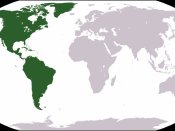Slavery in Colonial America goes back to the initial settlement of Jamestown. Although slavery was practiced in numerous countries during this era, its impact was very unique in America. Originally men owed debts as a result of their trip to the new world and worked to pay off the debt. Eventually though this indentured servitude was greatly abused.
There were several economic factors during this time that contributed to the growth of slavery in the United States. Generally speaking, during the colonial era the economic rise in American society led to increase in plantations and the growth of urban areas.
In the southern states, the economy was centered on agriculture: cotton, sugar, tobacco, and other crops flourished in the south. Without the technology we have today these crops required tremendous labor and time to cultivate. The plantation owners, in their efforts to compete in the free economic system and to produce large amounts of good crops turned to buying slaves to increase their productivity.
If they paid good wages to numerous workers the plantation owners would not be able to make money. Slaves were seen as dependable, very strong physically, and cheap.
Along with the growth of plantations, the capitalistic frame of mind during the time and increased industrialization in Europe with its demand for products from the Americas were two other economic factors that proliferated slavery. The demand for more slaves on the plantations only increased the buying of slaves in Africa to bring to the Americas. Slave traders in their greed capitalized on the opportunity. The slave traders developed a trading system called the Triangle Trade system to help inflate their profits. Slaves were brought from Africa to the Americas and traded for the products of the cash crop economy (which was built on the backs of the slaves). These goods were then exported to Europe and traded for manufactured goods. These products would then be brought to Africa to purchase the slaves (Unknown, 2009). The system was self-perpetuating and the traders were making money at every point on the triangle.
Slavery had an enormous impact on the emergence and history of the United States. First, and ashamedly so, the cheap labor and the proliferation of the plantations helped establish the early economy of our country. Agriculture and capitalism working together largely shaped the financial and social landscape of the south.
Slavery became the cause of internal conflict in our country that has not been seen since. The disagreements between the northern states and southern states concerning the issue eventually and ultimately led to the Civil War. This was a great conflict in our country that led to the death of hundreds of thousands of young men. It was a time of great turmoil.
Lastly and probably most importantly is the racial rift between blacks and whites that slavery caused that would exist for a long time after slavery ended and even exists to some extent today. Even after the civil war ended, and slavery was abolished by Abraham LincolnÃÂs Emancipation Proclomation, black men and women suffered injustice and repression for years afterwards. For example, in the south, universities were not even integrated until the 1960ÃÂs, one hundred years after slavery ended! During this same time in certain areas blacks were not allowed to use certain public facilities that whites were. There is still resentment in the hearts of some of our African American citizens towards white people, and it traces all the way back to this terrible practice.
Works CitedUnknown, (2009). Triangular Trade. Retrieved January 25, 2009 from Wikipedia web site: http://en.wikipedia.org/wiki/Triangular_trade





